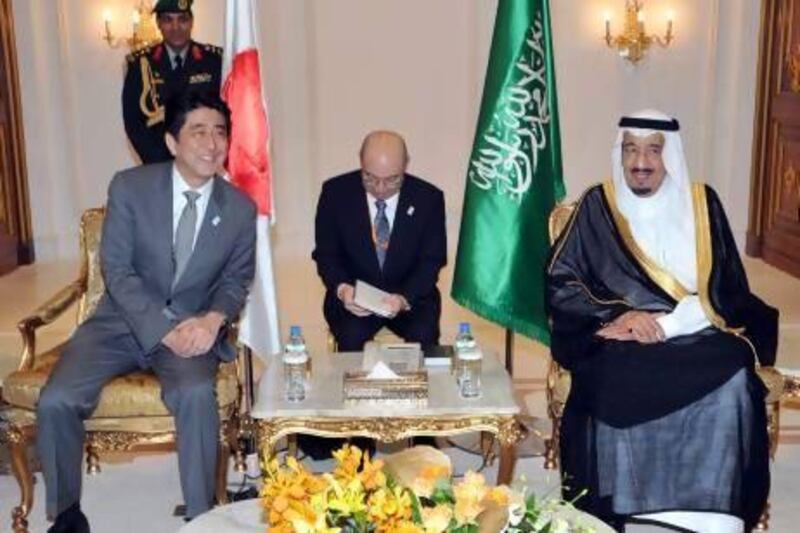ABU DHABI // The arrival last night of the Japanese prime minister, Shinzo Abe, marks the 10th high-level visit to the UAE by a Japanese official since 2001.
The two-day visit is the Japanese leader's third stop on a four-nation trip taking in Russia, Saudi Arabia, the UAE and Turkey and will help to cement the UAE's strengthening relationship with a country it has had oil ties with since the 1960s.
It was only last month that the Foreign Minister, Sheikh Abdullah bin Zayed, met Mr Abe while on an official visit to Tokyo. At that time Sheikh Abdullah stressed the importance of the relations between the UAE and Japan, and the desire of the leaders of both countries to strengthen and diversify avenues of cooperation between the two.
Mr Abe praised the investment environment in the UAE, which, he said, had made the country a major business hub and destination for major international companies.
Economic and trade ties were discussed as well as ways to encourage investment, advance industrial projects and other projects in areas of renewable energy and peaceful nuclear energy.
According to Sean Foley, an associate professor at Tennessee State University, aside from the five permanent United Nations Security Council members - the US, UK, France, China and Russia - the UAE is one of the few countries to maintain very close commercial and political ties with Japan. And these ties have been influenced by energy needs, according to the London School of Economics' Japanese researcher, Sumiyo Nishizaki.
"Fully aware of its status as a country with hardly any energy resources, Japan has engaged in energy diplomacy and investment in oilfields in the Middle East," he said.
Japan recognised the UAE immediately upon the creation of the federation on December 2, 1971.
"Four years before the formation of the country, economic relations were established and three Japanese oil companies entered an international tender by Abu Dhabi for concessions in its oilfields in 1967," said Koichiro Mastumoto, the deputy director of the Middle East division at the Japanese ministry of foreign affairs.
Mr Mastumoto said the UAE had been a major pillar of Japan's energy policy since 1967 and his country was determined to enhance the long-standing cooperation and economic relations between the two.
"For the past four decades, roughly 40 per cent of all oil produced in the UAE has been exported to Japan," he said. "The big share demonstrates Japan's determination to import UAE's oil irrespective of international circumstances, such as oil-market fluctuations and the oil-price shock that followed the October 1973 war in the Middle East."
The two countries will this month celebrate the 41st anniversary since diplomatic ties were formally established in 1972. The UAE then inaugurated its embassy in Tokyo in December 1973, while Japan reciprocated in April 1974.
According to Japanese Embassy figures, the number of Japanese residents in the UAE has now passed the 3,500-mark.
Annual UAE exports to Japan now exceed US$22 billion (Dh80.8bn), mainly due to crude oil and natural gas, while Japanese exports to the UAE exceed $6.9bn, mostly in electronics, vehicles and machinery.
Last year, in a further boost to Japanese-UAE relations, flights between Abu Dhabi and Dubai to Tokyo's Narita airport doubled to 14 a week, and an Abu Dhabi-Haneda route was opened, Mr Mastumoto said.
In terms of international security, the UAE and Japan have been partners in their call for nuclear disarmament and non-proliferation.
In 2011, the pair agreed to continue to cooperate on the issues during the second foreign ministers' meeting on nuclear disarmament and non-proliferation in Berlin.
Last year, the Ministry of Interior undersecretary, Lt Gen Saif Abdullah Al Shafar, and the deputy director-general of the Japanese national anti-narcotics agency established ties between the two countries' interior ministries in the areas of security and anti-drugs.
[ amustafa@thenational.ae ]






